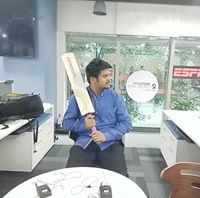The Indian contingent taking part in the 2018 Asian Games scripted a piece of history as the duo of Pincky Balhara and Malaprabha Jadhav won the silver and bronze medal, respectively, in Kurash, a lesser known form of martial arts, at the Gelora Bung Karno Area in Jakarta.
Malaprabha Jadhav, who hails from Turmuri, a small village near Belagavi in Karnataka blazed through her round of 32 match against Philippines' Helen Dawa with a commanding 3-0 win and continued her dominating run into the quarterfinals, where she thrashed her Vietnamese opponent Van Ngoc Tu 5-0 to claim a place in the semifinals and also assure India at least a bronze medal from the competition.
Similar was the case of Pincky Balhara, who powered her way through to the quarterfinals with a 5-0 win over her Chinese Taipei opponent Tsou Chiawen to build on confidence as she hardly broke a sweat in the quarterfinals to overcome Indonesian opponent Susanti Kusumawardani by a 3-0 margin.
In the semifinals, Malaprabha Jadhav fell to a top-notch performance from Uzbekistan's Gulnor Sulaymanova who romped home to a 10-0 victory while Pincky Balhara cruised to the gold medal match with a 1-0 victory over Oysuluv Abumajidova.
However, in the finals, Pincky was no match to the might of the 27-year old Sulaymanova, who picked ten points in a row to win over superiority and clinch the gold medal while Pincky finished with a silver-medal finish.
The two martial artists put up exhilarating performances to bring home two more medals and with that also began a new chapter in Indian sports. Here are ten things to know about the sport -- Kurash.
#1 History and origin of the sport
Kurash, which is another form of wrestling, finds its roots in Uzbekistan and circles around the practices of folk wrestling in Central Asia. The main objective of the sport is to grab hold of the opponent off their feet, throw them on the ground on their back and claim victory.
#2 Kurash is the highlight of 'Sabantuy', a summer festival
Kurash is one of the main attractions of the summer festival 'Sabantuy' that is conducted in Russia. While the sport is held for athletes of all ages, the main event is the final of Kurash or as it is locally called, 'Koras'. The winner of the final goes on to earn the tag of 'hero of the Sabantuy' and is given a prize at the end of the competition.
#3 Tracking the dates back to 1928
The first official Kurash championship can be traced back to 1928 when Kazan hosted the first official all-USSR Kurash championship that was followed by the inaugural Tatar Autonomous Soviet Socialist Republic (TASSR) national championships in 1949.
#4 A wide array of championships
Kurash has been popularised by the emergence of the International Kurash Association (IKA), which has hosted championships such as the World Senior Championships, World Junior Kurash Championships for the U20 category, the Asian Kurash Championships and the Asian Junior Kurash Championships amongst others.
#5 'Tazim', to start a fight
The sport of Kurash involves two fighters who, at the start of the contest, wait for the referee to signify 'Tazim' and shout 'Kurash', which then signals the commencement of the match. Tazim involves the wrestler to bow at each other with the right hand on the left breast.
Each wrestler is dressed in a judo outfit either green or blue in color, who bow down and approach the center of the court where they wait for the referee to shout 'Kurash' to start the battle.
#6 Point-scoring methodologies
There are three main ways to score points which are known as Halal, Yambosh, and Chala. To score a Halal, the fighter must throw his/her opponent on their back to win the game. Yambosh, which is close to a halal but more of a landing on the side of the body is the second type -- of two Yamboshes -- makes one Halal. Chala, independent of Halal or Yambosh, awards one point for each move.
#7 Types of penalties in the game
Kurash follows a three-step penalty system that ultimately leads to disqualification. The first penalty called is known as the 'Tambik', the subsequent call from the referee is called 'Dakki' and the final penalty, if called leads to automatic disqualification is known as 'Girrom'.
#8 'Tokhta', 'Bekar' and 'Vakt'
During a fight, the referee can choose to pause the bout by extending his arm forward and turn his palm forward, which is called the 'Tokhta'. Moreover, when the referee waves his hand repeatedly, it is known as 'Bekar', which signifies that the throw does not carry any points with it. In simple terms, no point is awarded to either wrestler.
At the end of the fight, the referee extends both arms upwards and claps both hands to signal the end of the fight.
#9 Kurash's debut at the Asian Games
The wrestling-based sport made its debut at this edition of the Asian Games having initially been a part of the 2007 Asian Indoor Games. The event, which features four men's category events and three women's category events will be contested at the JCC Assembly Hall, Gelora Bung Karno Area.
#10 India has hosted the World Junior Kurash Championships twice
Kurash, the national sport of Uzbekistan has also been hosted by India on two occasions, once in 2010 and 2016, and on both times, the World Junior Kurash Championships for the Under-20 competition was contested. In 2010, New Delhi played host to the contest while in 2016, the competition was held in Kochi.
What do you think about the sport of Kurash? Do you think if India keeps winning medals, it will become popular? Do let us know in the comments section below!
